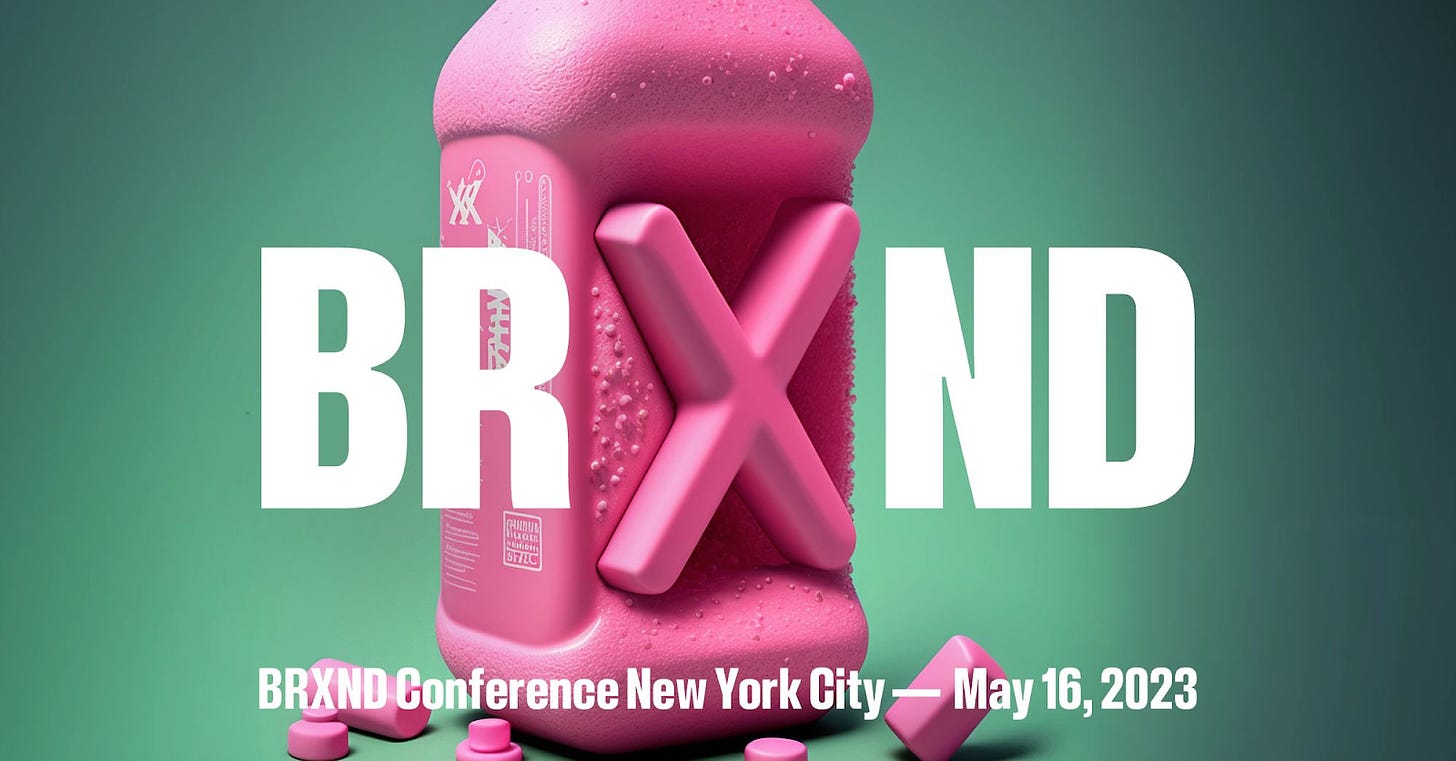The Era of Digital Magic // BrXnd Dispatch vol. 012.5
How Generative AI and models like Toolformer Could Transform Our Lives. Plus lots of interesting links & early bird ticket discounts.
You’re getting this email as a subscriber to the BrXnd Dispatch, a bi-weekly email at the intersection of brands and AI. On May 16th, we’re holding the BrXnd Marketing X AI Conference. Early bird tickets are 20% off until 4/1. If you’d like to learn more or sponsor the event, please be in touch.
Today I’m excited to have a guest post from my friend Craig Hepburn. Craig is a digital marketing and technology executive with over 20 years of experience. Since 2018, he has been head of digital at UEFA. He and I were chatting about all things brands and AI, and I asked him if he’d be up for publishing some of his thoughts. Thanks, Craig!
Technology has been a part of our lives for decades and has played an essential role in helping businesses operate more efficiently. However, for many years, we have been oversold on the benefits of software to solve business issues. Despite the increasing number of tools available on the market, the overwhelming amount of options, and the need to make them all play together, have only increased the costs and resources required to operate them. Large ERPs and other enterprise software have overcomplicated our working lives and frustrated customers. We have been left with the feeling that technology has not delivered on its promise to help us work “smarter, not harder.”
Think about the last time you needed to pull a simple report from multiple sources, schedule a meeting, plan a workshop, or create a presentation. Each task requires you to interface with an array of tools and platforms, taking up significant time even though the need arises frequently. Sometimes it’s hard not to wonder how so many smart people built so many dumb tools. Even though each was bought with the promise of automating the manual work away, leaving the team with more time to focus on higher-value strategic and creative tasks, the reality hardly ever matches.

Enter AI generally, and the “Toolformer” specifically. For the first time, it feels to me like we’re actually on the cusp of software that truly frees us up to focus on our more important tasks—and I’m not even trying to sell you anything. If you’re not familiar with the idea of a Toolformer, it’s a specifically trained large language model designed to be able to take advantage of available APIs to help it do its work. Here’s an explanation from an excellent post by Jesus Rodriguez at Towards AI:
Given just a few examples of how an API can be used, Toolformer annotates a large language modeling dataset with potential API calls. Through a self-supervised loss, the model determines which API calls are useful in predicting future tokens and fine-tunes itself accordingly. With this approach, language models can learn to control a variety of tools and to make informed decisions on when and how to use them. Toolformer allows the model to retain its generality and to independently decide when and how to use various tools, enabling a more comprehensive utilization of tools that is not tied to specific tasks.
Meta AI’s Toolformer model learned how to use different tools by themselves and decide when and how to use them. In theory, this would mean that you could prime it to your needs, and it could provide an answer or perform a task using the right tool or software program. And it can do all of this nearly autonomously, making it a powerful tool for augmenting human intelligence and improving our ability to perform a wide range of tasks. Take, for example, travel. If you ask chatGPT to book a flight for you, it can't do that on its own, but ToolFormer can call the appropriate API to use a travel app to access flight information and booking tools and then provide you with a booking confirmation.
When I read something like this and experiment with the available tools in the AI landscape, I wonder if we’ll finally have the opportunity to spend more time building relationships, discussing problems, and focusing on human interaction rather than grappling with corporate technology.
If all that sounds too good to be true, I don’t blame you for being skeptical. Nearly every vendor has spent the last twenty years promising us exactly this outcome, and, on a whole, the tech has failed to deliver us to that lofty promise. But for the first time in my working lifetime, I feel excited that we may be reaching that plateau—with the overpromise of technology finally becoming a reality with the emergence of Generative AI, models like Toolformer, and the lowering cost of compute power. By removing the need to interact with hundreds of tools and spending more time solving real challenges and interacting with people, these new applications could transform how we work and live. As businesses continue to adopt these technologies, we can expect to see a significant shift in how we think about and use technology.
Craig Hepburn is a digital marketing and technology executive with over 20 years of experience. As Head of Digital at UEFA since August 2018, he has successfully developed new innovative digital products and services that cater to the changing habits and needs of fans worldwide, increasing engagement and extending UEFA's competitions to a global audience.
Prior to joining UEFA, Craig held leadership positions at Tata Communications and Microsoft, leading global digital teams to execute successful business transformation strategies.
A big thank you to LinkedIn, Redscout, Nova, Otherward, and Persistent Productions for sponsoring the upcoming BrXnd conference and my work. I have various sponsor levels available for the event if you want to support us. Be in touch (or reply to this newsletter), and I’m happy to send over the details.
And now some links …
Some links and thoughts from the intersection of brands and AI. If you have good links for me, please send them my way by replying to this email, leaving a comment, or sending an email.
[The New Stack] Good piece on Cohere vs. OpenAI in the enterprise. I’m intrigued by which of these platforms will put together the perfect set of features/security options to truly crack the enterprise. Bain made a big announcement with OpenAI, and the latest ChatGPT API release included specific policy changes to prevent submitted data from being shared (“Data submitted through the API is no longer used for service improvements (including model training) unless the organization opts in”). But still, from my conversations, many enterprises aren’t quite ready to make the leap until more issues are worked out. I have a session already planned for the conference that will focus on enterprise questions.
[Twitter] I’m sure many of you have seen this by now, but designer Pietro Schirano posted an impressive set of generated Nike images that took advantage of ControlNet, a new StableDiffusion model. ControlNet might be my favorite new tool. It finds the outline of an input image and then allows you to use regular prompts to generate a new image that emerges around those outlines. Pietro’s animation below shows the possibilities:


[AdAge] How PR agencies are using AI. To that point, I added a PR category to my marketing AI landscape.
[Humane Ingenuity] There are a lot of articles about large language models and AI trying to draw out metaphors to help us better conceptualize how they work. I liked this article’s attempts more than most:
By preprocessing countless words and the statistical relationships between them from million of texts, an LLM creates a multidimensional topology, a complex array of hills and valleys. Into this landscape a human prompt sets in motion a narrative snowball, which rolls according to the model's internal physics, gathering words along the way. The aggregated mass of words is what appears sequentially on the screen.
[Twitter] This is perfect.

[Axios] Generative AI is a legal minefield.
[Coherence] Want to try out using AI for code generation? My friends at Coherence have launched an open-source bot capable of generating tests that you can run on the Coherence platform.
Thanks for reading. If you want to continue the conversation, feel free to reply, comment, or join us on Discord. Also, please share this email with others you think would find it interesting.
— Noah





